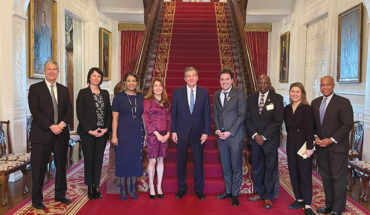photographs by Lissa Gotwals
At their hot new restaurant in downtown Raleigh, brother-sister duo Vansana and Vanvisa Nolintha are doing something revolutionary.
With one of the few true Laotian restaurants in the United States, these two twenty-somethings are introducing Raleighites to the fresh and unexpected cuisine of their tiny native country. They’re doing it with the help of a local community rooted at N.C. State that has risen up to make their dream a reality. And they’re doing it in tribute to their parents, who have been prevented by post-9/11 visa restrictions from traveling here to witness their children’s achievement.
“It’s been a long journey for us,” says Vansana, 27, an N.C. State graduate who goes by the nickname Van. Sent by his parents to live with a family friend in Greensboro to learn English when he was 12 (his sister Vanvisa, now 25 and a graduate of UNC Greensboro, followed a couple of years later), “cooking Laotian food was the only way to find peace and comfort in this new land,” he says. “At the time it was such a dramatic transition, and now it has come full circle.”
Full circle means Bida Manda, their new, chic, bustling Moore Square restaurant. Chock-full, on this late spring afternoon, with Raleighites flocking to the Nolinthas looking for peace, comfort… and delicious food.
One of them is Ashley Christensen, the award-winning chef/owner of Poole’s Diner, Beasley’s, Chuck, and Fox Liquor Bar. She walks in unobtrusively, a face in the crowd, and takes a seat at the bar to wait for a friend. Why is she here? “Because I love it. It’s fantastic,” she says. “It’s such a unique cuisine for Raleigh, and the team running this place is fantastic. I probably eat here more than anywhere else in Raleigh now.”
What Christensen and the diners around her know is that Laos – a modest, landlocked nation only slightly bigger than the state of Utah – cooks big. And the Nolinthas are doing it justice.
With ingredients common to the food of its neighbors in China, Vietnam, and Thailand, and with techniques inherited from its years as a French protectorate, Laos’s food is a tantalizing hybrid. Flavors are refined but surprising; dishes are familiar but refreshing, and always beautiful.
The popular caramelized ginger pork ribs, which take hours to cook in a very low oven, arrive propped delicately against a shaped mountain of rice. The spicy but fresh papaya salad is made of unripe fruit julienned so finely you might think you’re eating vermicelli. And a crispy rice lettuce wrap creates a still life of color and shape on the plate.
Chef Lon Bounsanga, 41, who emigrated from Laos with his family as a child, was a banquet chef at Carolina Country Club when he saw the Nolinthas’ ad on Craigslist for a Laotian chef. “I thought it was a hoax,” he says. Now, cooking with his favorite ingredients such as cilantro, mint, lemongrass, and sticky rice, he feels he has come home. “This is something our ancestors have been doing for centuries,” he says. “We are just trying to share it with everyone.”
Laotian cuisine is little known here because Laos itself is little known, Van says, outside of its complicated involvement in the Vietnam War. To entice American diners, Laotian dishes are sometimes served up as “Thai” in the hopes of making them accessible, he says. One of only four other true Laotian restaurants Van knows of in the United States is in Falls Church, Va. …and calls itself Bangkok Golden.
Creating a straightforwardly Laotian restaurant was an important point of pride for the Nolinthas, Van says: “It’s about identity and culture.” And it’s about the Nolinthas’ parents, Amphone and Sompheng Nolintha, whose influence is tangible though they live nearly 9,000 miles away. Bida Manda – which means father and mother in Sanskrit – reflects the elder Nolinthas’ hospitality, borne from their years in the hotel business, and it reflects their home-cooked food, created from the family and neighborhood recipes Van and Vanvisa went home to collect. It’s also about the devotion of their children. “We are always thinking about them,” Van says.
When he and his sister told their parents they wanted to start a Laotian restaurant here, the Nolinthas gave them more than recipes. They sold a piece of land that would have been their children’s inheritance to help them fund it. Now Van and Vanvisa have the responsibility of tending the restaurant just as they would have tended the land, Van says.
In a world of market research, trend-casting, and the hot new thing, Bida Manda is not a concept restaurant. It’s an honest offering.
Opening the restaurant one recent morning, Van unlocks the door and juggles the Trader Joe’s tulips and roses tucked under his arm. He is sharply dressed, as he tends to be, in a jacket and tie. Vanvisa follows him under the black-and-white wedding pictures of their parents that hang from the ceiling; Van flips the lights and gets Ella Fitzgerald crooning on the sound system while Vanvisa, elegant in a pale dress, lights sandalwood incense at a small altar in the front window.
“Every morning we pray for the soul that lives in this space,” she says. It’s a lucky soul. The space it lives in – formerly the Duck & Dumpling – got a barn-raising of a facelift from 55 friends, most from N.C. State, volunteers all, who collectively worked 750 hours to turn it into the elegant place it is today. They helped unpack and wash every dish and glass. They wired three tons of fallen branches from North Carolina forests to the walls. The sections completed by engineering students display perfectly aligned rows, Van points out; those tackled by design students and artists whirl, like water in an eddy.
“The sticks became a mantra, a meditation, a prayer,” Van says. Woven together, they create an exotic, embracing nest.
The generous spirit that helped create and now helps fill this place is important, Van says. “There is a collective feeling and energy here,” Van says. “It says a lot about the soul of the people in Raleigh. The creative, young, entrepreneurial spirit here is really meaningful.”
Other than the sticks, Bida Manda’s décor – executed with the skills Van honed as a student at State’s design school – is a spare paean to the Nolinthas’ heritage. Portraits of their parents, and of the Buddha, are woven into a tapestry near the bar. A motif stenciled on the walls is the symbol of their home temple. Photographs of young Laotian monks in their native Luang Prabang province walking, praying, and rowing a boat along the dining room wall depict the active state of meditation Van espouses.
When he is walking – like the monks in the photos, and the monk he himself became as a boy – Van says he is mindful of walking. When he is eating, he knows he is eating. And when he is working – boy, is he working. “We are always here,” Vanvisa says, when asked how she spends her days. “The restaurant is our home.”
In many ways, Vanvisa and her brother are quintessential first-generation immigrants. They live modestly, sharing a small apartment with a roommate. They work hard. They are proud of their heritage, and honored to be given a bona-fide American chance. And they’re not afraid to go to their community for help.
In other ways, they are quintessential hip young entrepreneurs changing Raleigh’s business and cultural landscape. Though they worship at the Buddhist Yannasangvararam Temple in Knightdale, their community is clearly centered around N.C. State, with friends like fellow graduates Christensen and Raleigh Denim co-founder Sarah Lytvinenko (who is part of this month’s cover story). Their wait staff is packed with friends from college, some now completing their doctorates. Their customers include endless former and current State students and professors – as well as young Red Hatters from around the corner, and elderly Asian couples tucking in to bowls of the spicy noodle soup known as pho.
The food may be the main draw, but the Nolinthas don’t hurt. “When I first met Van, I thought he was one of the most unusual people I had ever met,” says Janice Odom, his mentor and the director of the prestigious Caldwell Fellows leadership program at N.C. State, which Van completed. “I thought, where does this magical person come from? Then I went to Laos and met his family.” She says the spirituality, generosity, and hospitality she sees in Van and his sister are a birthright.
Odom – who helped connect the Nolinthas to Bida Manda’s landlord, Greg Hatem – has gone to Laos twice with Van and the Caldwell Fellows. The scholarship program, which teaches servant leadership, has taken Van all over the world on various projects. His education has been broad in other ways, too: Van studied peace and conflict studies at Oxford.
“Then he came in one day and said, I’m going to open a restaurant,” Odom recalls. “And I said, oh, please, don’t do that.” Restaurants are risky, expensive, and exhausting, she told him. “But he had this vision.”
How did he go from design and peace studies to entrepreneurship? Design school, in hindsight, was perfect, Van says. “We were taught about problem solving, we were told to connect what we did with the bigger picture, and we were taught critical thinking. It all helped with the restaurant.”
And, Odom says, his peace and leadership training are at work here, too. “What is peacemaking? You build community,” she says. “And this restaurant is that.”
Chef Bounsanga says the community aspect of the Bida Manda venture is key to its authenticity and success, and that something more than cooking and eating is going on when he’s sharing his culture. It brings tears to his eyes to tell the story of an elderly diner seeking him out to tell him that his chicken curry was the best she’s ever had.
It’s people like that woman – or like Ashley Christensen coming in for a bowl of crispy pork belly soup after a night running her own restaurants – who make it all worthwhile, Vanvisa says. “Raleigh is filled with open-minded people willing to try new things,” she says. “In some ways,” Van adds, “the community believed in us before we did.”
So, clearly, did their parents. Van and Vanvisa know well where their next challenge lies: Finding out how to get Amphone and Sompheng Nolintha to Raleigh. Luckily, they’ve got a whole community behind them.
Crispy Rice Lettuce Wrap
2 cups cooked jasmine rice
1 teaspoon curry spice
1/2 tablespoon salt
1 teaspoon sugar
1/3 cup chopped cilantro
1/3 cup chopped mint
1/3 cup chopped green onion
1 tablespoon crispy fried garlic
3 tablespoons lime juice
1/2 cup crushed peanuts
Lettuce leaves
Mix jasmine rice, curry, salt, and sugar in a small bowl. Mold the mixture into thick patties. Fry the patties until golden brown. In another bowl, break the patties into small pieces, and add cilantro, mint, green onion, fried garlic, peanuts, and lime juice. Toss until fully mixed. Wrap the mixture with fresh lettuce leaves.
Serves 4
Caramelized Ginger Ribs
1/2 rack pork ribs, sliced into individual rib pieces
1 cup soy sauce
1 cup black soy sauce
1 cup sliced fresh ginger
1/2 cup brown sugar
2 shelled hard boiled eggs
Firmly rub the the ribs with soy sauce, black soy sauce, ginger, and brown sugar, and let the ribs marinate overnight. At medium heat, braise the ribs for three hours. Once done, strain the sauce from the ribs, add shelled, whole hard boiled eggs to the sauce, and reduce the sauce in a pan over low heat until it thickens. Add the ribs back to the sauce, remove and slice eggs, and serve together.
Serves 2







